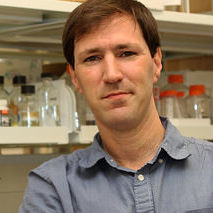Albert Bowers, Ph.D.
Vice Chair, Division of Chemical Biology and Medicinal Chemistry
Associate Professor, Division of Chemical Biology and Medicinal Chemistry
 PHONE
PHONE919-962-4336
abower2@email.unc.edu
ADDRESS
125 Mason Farm Rd., Marsico Hall 3107, CB# 7363, Chapel Hill, NC, 27599
DOWNLOAD CV
ACCEPTING DOCTORAL STUDENTS
Albert Bowers received his PhD in organic chemistry (synthetic methods) from the University of Illinois at Chicago. He carried out postdoctoral research (total synthesis) at Colorado State University before moving as an NIH sponsored fellow to Harvard Medical School (biosynthesis). He is a member of the UNC Lineberger Comprehensive Cancer Center and affiliate member of the Center for Integrative Chemical Biology and Drug Discovery.
Research
Key words:
- Natural products medicinal chemistry
- Combinatorial synthesis and biosynthesis
- Structure-based drug design and mode of action
Research in our lab is concentrated on the synthesis, assessment, and modification of potential therapeutic leads, especially those derived from natural products. We use chemical synthesis as well as genetic manipulation of the natural biosyntheses to access and modify compounds to study structure-activity relationships (SAR). These efforts involves the integration of basic concepts in organic reaction mechanisms, synthetic organic chemistry, biochemistry, molecular biology, bioinformatics and computational chemistry.
A major focus of the lab is using genetic information about natural product biosynthesis to manipulate pathways, create new compounds, and rationally modify or improve their pharmacology. This has the benefit of efficiently accessing complex natural-product-like structures without the need for step-wise synthesis chemical synthesis. In particular, we are engineering several exceptionally promiscuous enzymatic pathways to make modified versions of their endogenous products with new biological activities. We have had success in targeting libraries of these engineered compounds against a number of challenging but important cancer targets. A mechanistic understanding of these pathways is also allowing us to expand on the endogenous structures by incorporating unnatural functional groups, capable of reacting in parallel. Additionally, we are exploring the ability to express the engineered pathways in presence of potential targets in order to ‘evolve’ new natural-product-like inhibitors.
Our laboratory also actively pursues SAR of several natural products by means of chemical synthesis. A number of natural products have been ignored clinically (as well as industrially) due to fundamental shortcomings, such as poor solubility or excessive cytotoxicity. Research in the lab is aimed at removing these impediments to clinical relevance by developing efficient syntheses of proposed active fragments and investigations of the minimal basis for their activity. Compounds currently being worked on in the lab target multi-drug resistant venereal infection (gonorrhea and chlamydia) and aberrant gene regulation involved in cancer progression.
Most bacterial genomes have the potential to produce many more, potentially-therapeutic natural products than have been isolated to date. We work with collaborators here at UNC and at peer institutions to elicit or turn on these unknown biosynthetic pathways and characterize their products.
Chemoenzymatic Synthesis, Mode of Action and Evolution of Natural Product-based Macrocycles
- Visiting Scholar, National Institutes of Health, Bethesda, Maryland
- PhD in Organic Chemistry, University of Illinois at Chicago, 2007
- Visiting Scholar, Kyoto University, Kyoto, Japan, 2005
- BA in Art History, University of Chicago, 2001

